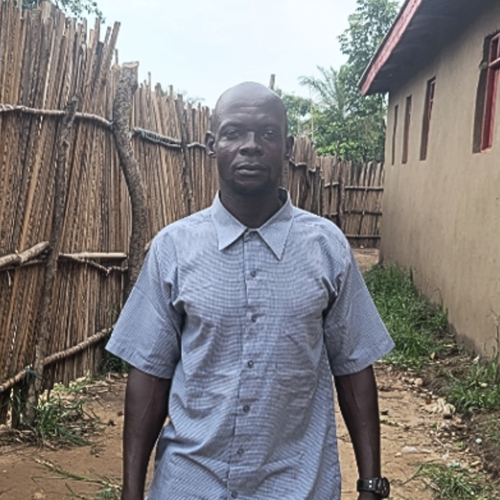Community action creates safer schools and builds brighter futures
In Mahagi, a lack of resources prevents many schools from ensuring the safety of their students, which compromises children's learning and makes it necessary to implement initiatives to reduce risks. With the Elimu Kwanza project, DRC supports schools in Mahagi with grants to implement risk reduction plans.

In Ituri, schools are severely affected by armed conflict, with many closing for security reasons or due to occupation. In March 2025 alone, 3,000 children were deprived of schooling in the Mahagi territory (OCHA, Sitrep, March 2025). Population displacement is the primary cause of school dropouts, with more than 300,000 children displaced in August 2025 (IOM DTM, August 2025), but school closures due to armed conflict also weigh heavily. Schools that are still functioning lack the resources to meet the necessary security requirements and guarantee a safe and protective learning environment for children. Due to the lack of security, parents are losing confidence in schools and are not encouraging their children to continue their education. Out of school, children are at even greater risk, and many of them find themselves exposed to recruitment into armed groups, sexual violence, or forced labor.
Since 2023, the Elimu Kwanza project: Education First for Vulnerable Children and Youth in Ituri, funded by DG-INTPA and implemented by DRC in collaboration with the Norwegian Refugee Council (NRC), has aimed to strengthen the resilience of school systems. The project includes several measures to improve learning and safety conditions in schools that welcome displaced children and children from host communities. The development of a protection risk reduction plan enables each school to reduce the immediate dangers faced by students by creating a safer and more protective learning environment.
Schools vulnerable to outside intrusion
The Mahagi territory is located near areas of Ituri affected by armed conflict. This location has led to the arrival of large numbers of displaced people and precarious living conditions for both host communities and displaced persons. In the Rimba and Angumu health zones, the Girube and Pike primary schools lacked the resources to prevent risks related to student safety. Both schools were faced with motor vehicles intruding onto their grounds. The president of the Girube Parents' Committee (COPA) reports "cases of road accidents affecting students" involving motorcycles and trucks speeding through the schoolyard. The president of the Pike School COPA reports similar incidents: "Previously, vendors and motorcycle taxis used the schoolyard as a shortcut and drove through it at high speed." Vehicle traffic was not the only source of intrusion that schools faced. The lack of clear boundaries around the school grounds led to recurring unwanted visits. At Girube School, the COPA president says he has witnessed domestic disputes between neighbors in the schoolyard. Although these intrusions may seem harmless to students, they hinder their concentration and highlight an undeniable security risk due to the lack of control.
This lack of control also allowed children to enter and leave school whenever they wanted: in both schools, some students left their desks to go and play in the nearby displacement camps or wander around the surrounding markets. The latter led to significant absenteeism, which in turn impacted the students' academic performance.
Demarcating the school grounds to improve children's safety
In order to address the identified risks, DRC provided $100 in financial assistance to the schools in Girube and Pike to establish a risk reduction plan. The construction of fences to demarcate school grounds and create a safe playground was identified as a priority by the communities. These improvements now allow children to study in a more protected environment that is more conducive to learning. The assistance provided has had a real impact on both schools, as the president of the Pike School COPA points out: "Today, the risks have been reduced and the children's safety during school hours is ensured." The COPA president of Girube School also adds that "the fences are not just physical barriers, they are a symbol of [their] commitment to the safety of [their] children."
The implementation of safety measures, as simple as building fences, contributes to children's safety and thus ensures that they can exercise their right to education. The right to education is not limited to access to classrooms; it also includes the establishment of a protective environment.
Today, thanks to the risk reduction plan established by communities with the support of DRC through DG-INTPA funding, schools are better equipped to keep children in class and bring back those who had left. By providing a safer and better supervised learning environment, this system boosts parents' confidence and allows students to focus on their studies: "Thanks to the Danish Refugee Council's support and the mobilization of parents, we have regained control of the school environment."
With this fence erected around the school, we have seen a big change. [...] Previously, vendors and motorcycle taxis used the schoolyard as a shortcut and drove through it at high speed. In the past, there were a few cases of traffic accidents involving students. Today, the risks have been reduced and the children's safety during school hours is ensured
/ President of the Pike School Parent Committee
Previously, motorcycles and trucks used to speed through the school grounds, and we had a few traffic accidents involving students. Sometimes, neighboring households would come and continue their arguments in the schoolyard. It was also difficult to distinguish the boundaries of the school grounds from those of other properties in the community. The barriers are not just a physical obstacle, they are a symbol of our commitment to the safety of our children. Thanks to the support of the Danish Refugee Council and the mobilization of parents, we have regained control of the school environment.
/ Chair of the Girube School Parents' Committee